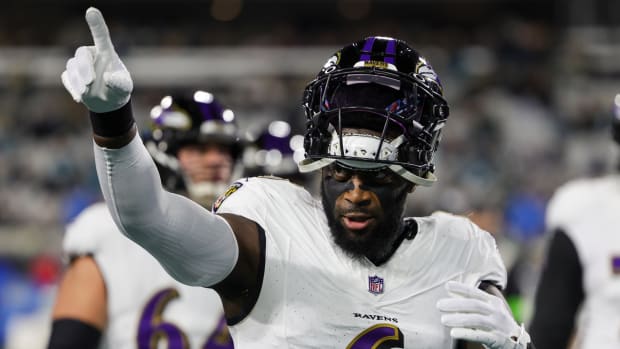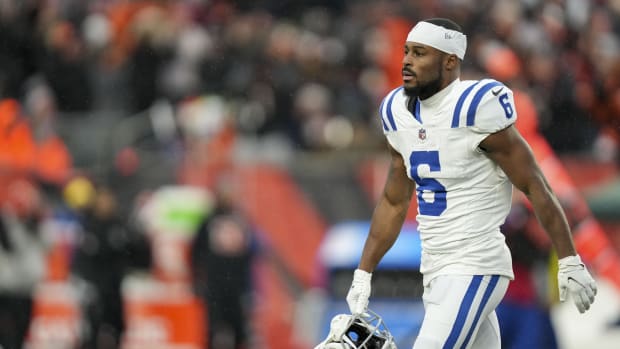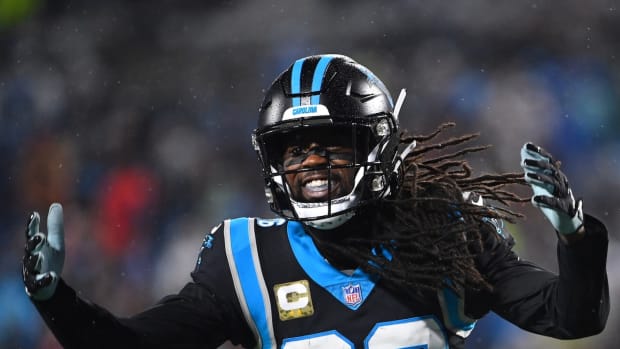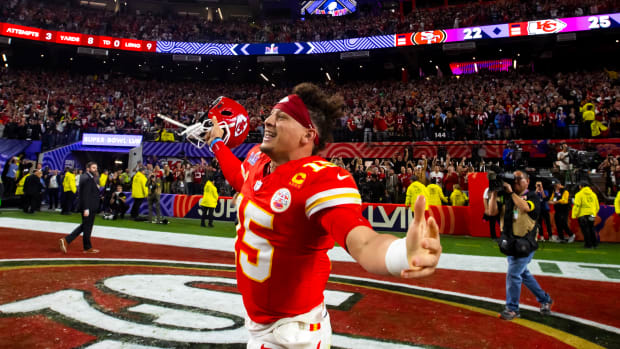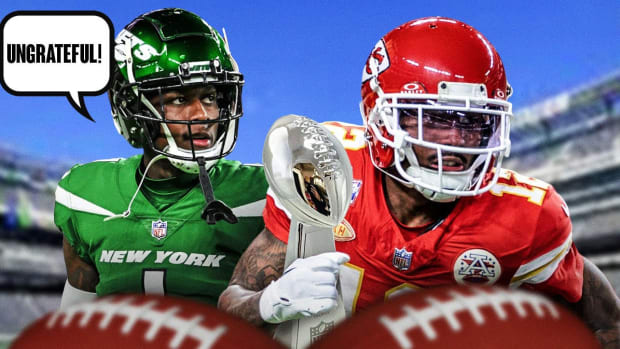In a City Hurting After Tragedy, Rams-Chiefs Brought Something Extraordinary
LOS ANGELES — The faint wisp of smoke that still hovered over Malibu, 30 miles from the Los Angeles Coliseum, provided the most obvious clue that Monday night’s Rams-Chiefs game would be different. The dozens of first responders hanging around the sideline before kickoff offered another hint. The bags under their eyes presented a third. Citizens of this city, especially its northwest corner, had been exhausted by the events of the previous twelve days. What they wanted—what everyone in L.A. needed—was for Monday night to feel normal.
Instead, they got something extraordinary.
One hundred and five combined points. More than 1,000 yards of offense. Thirteen total touchdowns. Most importantly, a win for the home team, against a worthy opponent—a victory marked, fittingly, by resilience.
ORR: Rams-Chiefs Broke the NFL For Good, So What Happens Next?
It was the first time that two teams had scored 50 points each in an NFL game. But this and all of the other eye-popping football stats were meaningless compared to the most important numbers of the day. Against overwhelming odds, the Woolsey fire had been stopped short of burning 100,000 acres—the damage stood at 96,949 at day’s end—and was 94% contained. A week earlier, it had blackened 91,572 acres with only 20% containment. That comeback had been made possible by people like Ken Roberts.
A captain in the Ventura County Fire Dept., Roberts worked two straight days, with no sleep, in the aftermath of the Borderline Bar & Grill shooting, which claimed twelve lives on Nov. 7. When his work there was done, Roberts went straight to the front lines of the fires that had been sparked the day after the shooting. “Today was the first day I’ve been home,” he said just prior to Monday night’s kickoff. “I had just enough time to take a shower and fight traffic to get here.”
The aura inside the Coliseum on Monday night was not one of mourning. Not even during the national anthem, which was sung by the choir from Cal Lutheran University—site of the Rams’ practice facility, and alma mater of the late Justin Meek, who had been gunned down at Borderline and at one point sung bass in that choir.
KAHLER: On Monday Night, Rams Honor L.A. Community Impacted by Tragedies
What the Coliseum felt like was relief. The 95-year-old building felt bright and shiny and full of life—the Rams’ canary yellow ‘Color Rush’ uniforms didn’t hurt—offering a haven from the wanton death and destruction of the fortnight just passed.
The Rams had given discounted tickets to first responders earlier this season, Captain Stan Ziegler of the Ventura County Fire Dept., pointed out, “but tonight feels different.” And not just because first responders got into the Chiefs game for free. “We’re not used to having the spotlight on us,” Ziegler explained. “In fact, most of us run from attention. We’re just thankful for this chance to relax and enjoy an evening, away from the stress of fighting fire and helping evacuate people.”
Before the national anthem, Ziegler and Roberts unfurled a massive American flag with hundreds other first responders, including Michael Williams of Ventura County Fire Station #36. Williams had been off duty when he first spotted the Woolsey Fire. After quickly calculating its path, he told his neighbors in Oak Park to evacuate. Then Williams watched his own home, where he lives with his wife and children, vanish into ash. He hardly paused, continuing to fight the wind-driven blaze that threatened his neighbors’ houses. He saved most of them.
Monday night, Williams’s buddies at Firehouse 36 were gathered around the TV watching the Rams and Chiefs go at it. Things were “pretty much back to normal” as far the fires were concerned, said chief David Schwab, lounging before the big screen. “Local residents have been coming by asking for sandbags. Soil erosion is the main concern at this point.” The game was tied at 23 when Schwab and his team watched Aaron Donald of the Rams execute his second strip-sack of the game. Eight plays later, Schwab celebrated when Rams quarterback Jared Goff—the son of a firefighter, and, like Schwab, a Cal-Berkeley product—scrambled into the end zone and finger-rolled the ball over the crossbar to give L.A. a 30–23 lead.
The efforts of firefighters like Schwab had been aided these last couple of days by a nighttime mist like the one that lowered itself into the Coliseum as Monday’s game wore on. This vapor, punctured by the 95 combined spirals thrown by Goff and Chiefs quarterback Patrick Mahomes, mixed with the Coliseum’s lights to create a movie-set feel. The most suspenseful game of the NFL season finally loosed its grip on its audience when Rams safety Lamarcus Joyner intercepted a wobbly pass from Mahomes with twenty seconds left, to seal the 54–51 win. Rams general manager Les Snead approached head coach Sean McVay and said, “Have you ever been through one like that?” knowing full well the answer.
McKNIGHT: Through Tragedy, California’s Sports Community Bonds to Ease the Pain
The victors’ locker room smelled like torn grass and hours-old sweat. Happy profanity abounded. Marcus Peters—Rams cornerback, team deejay, and former Kansas City Chief—cued up YG on the sound system.
“We felt like we had to do for this for the community,” guard Rodger Saffold said over the music, “because of the way they’ve stuck together. This win is a little more special than all the other ones.” The nine-year veteran’s face brightened with a sudden realization. “I’ve never been 10-1 in my life!”
It would be disingenuous to report that the home crowd had cheered louder than usual for the Rams on Monday night. For the first time this season, though, the volume of the home team’s fans was not exceeded by the visiting team’s supporters. Such is the plight of playing in a metropolis full of transplants. On Monday night, though, it was hard not to be an L.A. fan.
Ventura County Sheriff Sergeant Ron Helus had been a fan of Notre Dame football before he was killed at the Borderline Bar & Grill two Wednesdays ago. Moments before Helus entered the nightspot to try and put a stop to the shooting, he called his wife, Karen, and according to the Los Angeles Times, he told her, “I gotta go handle a call. I love you. I’ll talk to you later.”
Karen Helus and Jordan Helus, the 24-year-old son she raised with Ron, lit the Coliseum’s torch before Monday night’s game, just as someone on the sideline made the mistake of calling Ken Roberts—the firefighter who had worked, without sleep, at the scene of the Borderline incident, before moving on to the fires—a hero.
Roberts’s smile faded. On a night full of courageous deeds—the athletic kind, whose stakes are comparatively small—Roberts wanted to make sure that the H-word wouldn’t be misused.
“No,” he said firmly. “Ron Helus was a hero.”

































